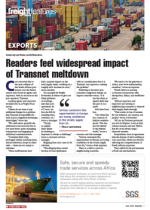Costs incurred due to the near collapse of the South African port system over the festive season were borne by agents and exporters, with no recourse to the port operator, Transnet.Leading agents and exporters revealed this in a Freight Newssur vey.“Clients do not want to pay additional charges for a problem that Transnet is responsible for – such as port congestion surcharges, demurrages,” wrote one.“We could never quantify the additional costs incurred due to lost man-hours spent managing transporters and engaging in additional communications.“Countless futile trips, prolonged vehicle standing times, missed deliveries, drops in client sales — there are too many to calculate.“These inefficiencies have had a massive impact on the total supply chain, resulting in a roughly 24% increase in costs,” wrote another.“An example for freight forwarders is where we give our client guidance on loadings, and then port operations do a U-turn; we foot the bill for standing time, overtime, etc,” wrote a manager.“ Tr y ing to explain these delays in berthing to importers is always a challenge,” wrote a customer services manager.Shipping lines also came in for criticism.“The shipping lines raised invoices for late upliftment with no consideration that it is Transnet, not exporters, causing the problem.”Referring to the $250-per-container congestion charge, an import controller wrote, “it is not the client or agent's fault that the port is in a mess”.Jobs have been lost.“Our client has lost a season of fashion-sensitive goods. This has put SA behind in the fashion world,” wrote a customs and risk manager.“Serious customers like supermarkets in Europe are losing confidence in the erratic supply from SA,” wrote a fruit exporter.There is a shift to ports in neighbouring countries.“We used to be the gateway to Africa, now we're embarrassing ourselves,” wrote an exporter. “South Africa is starting to become synonymous with disruptions, delays, and inefficient ports.“African exporters and importers are turning to neighbouring countries to channel their supply chain through.“This results in loss of revenue for our industry, our country, our people,” wrote a forwarder.“All our ex-Transnet personnel are now in Maputo. Look at their volume increase and also Walvis Bay for cross-Africa cargo,” observed another.Respondents were in agreement that the demise of rail is adding to costs and risks, which are directly affecting the competitiveness of South African exporters.They called for the privatisation of both rail and harbours.

